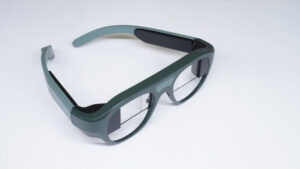
Lightweight AR glasses transcribe and display spoken language
Canadian Plastics
Materials Research & DevelopmentMade with material from Sabic, the glasses use automatic speech recognition technology.

Photo Credit: Sabic
The intersection of two global trends makes a new pair of augmented reality (AR) eyeglasses from Beijing LLVision Technology Co., Ltd., a very timely development.
First, according to the World Health Organization, about 1.5 billion people (nearly 20 per cent of the global population) live with hearing loss – a number that could rise to 2.5 billion by 2050 as the population ages. And second, there’s a growing need for international communications that has arisen with the loosening of COVID-19 restrictions. A remedy for both is to “listen” with your eyes, which is where the new LEION Hey glasses come in.
Featuring stems molded from Sabic’s Ultem 1000 polyetherimide (PEI) – which is supplied in a custom grey colour – the glasses use automatic speech recognition technology and artificial intelligence to create, stream, and display translations of voice input data in milliseconds, printing the spoken words across the lens. The glasses connect wirelessly to a smartphone app that handles user authentication.
The result is a product that can help avoid the challenges of hearing in noisy environments or lip-reading when people are wearing masks, and can facilitate communication in multilingual work environments and enable more-active business and social interactions.
At the outset, said CEO Wu Wei, Beijing LLVision’s goal was to make the lightest AR glasses on the market, since – like most corrective eyewear – they have to be worn for lengthy periods of time. But the number of components that needed to be integrated – including an optical module, microphone, and computer chip – was a complicating factor, since these add to the weight. Ultem PEI allowed up to a 30 per cent weight reduction compared to competing materials like amorphous polyamide, Wei said. “With the help of Ultem resin, we lowered the overall weight of our LEION Hey glasses to just 79 grams, or 2.8 ounces,” he explained.
The Sabic material also provided a host of other benefits, Wei said: more space for the embedded components by enabling thin-wall molding of the hollow stems, which contain both a lithium-ion battery and computer chip to enable the rapid, multi-language translations; combined stiffness and strength that allow the stems to clamp securely to the wearer’s head; flame retardance – rated for fire safety under the UL 94 V0, V2, and 5VA standards – that enhances the safety of devices that incorporate electronic components; and a non-halogenated formulation that doesn’t use either chlorine or bromine, both of which are associated with adverse health and environmental effects.
Sabic and Beijing LLVision are now partnering on a next-generation version of the LEION Hey glasses that will use a certified renewable, bio-based grade of Ultem resin.
